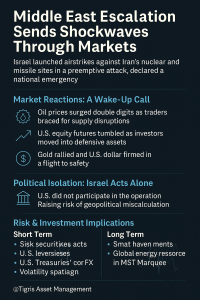
Middle East Escalation Sends Shockwaves Through Markets
Focused Keyphrase: Middle East Escalation Markets
A new era of volatility has arrived.
Overnight, Israel launched a targeted military strike against Iran’s nuclear and missile infrastructure — a bold preemptive move that escalates a long‑simmering rivalry into open conflict. As airstrikes hit Natanz and other sensitive military sites, Israel’s Defense Minister declared a national state of emergency, warning of imminent retaliation.
—
Market Reactions: A Wake‑Up Call
- Oil prices surged double digits — WTI jumped as much as 13%, and Brent surged over 10%, crossing $76/barrel. Markets are pricing in severe supply disruptions if Iran retaliates by targeting Gulf infrastructure.
- U.S. equity futures plunged in after‑hours trading as shelter‑seeking investors fled high‑beta names.
- Gold rallied, reaffirming its role as a geopolitical hedge, while the U.S. dollar strengthened against riskier currencies — though mixed signals persisted amid Fed rate‑cut expectations.
—
Political Isolation: Israel Acts Alone
What’s striking is the U.S. did not participate. While President Trump was briefed ahead of the strikes, Israel acted unilaterally. Secretary of State Marco Rubio emphasized that America’s priority remains protecting its forces, not offensive engagement.
This decoupling of U.S. and Israeli military actions reshapes how markets evaluate geopolitical risk and threatens traditional defense coordination in the region.
—
The Real Risk: Miscalculation
What happens next is critical:
- Iranian retaliation is expected, possibly via drones, missiles, or cyberattacks targeting Israel or U.S. interests.
- Oil infrastructure vulnerability is back in focus — from the Strait of Hormuz to Saudi and Emirati production sites.
- Global equity markets may enter a new volatility regime — driven by energy shocks and escalating geopolitical instability.
—
Investment Implications: What to Watch
Short Term:
- Expect heightened equity volatility, particularly in emerging markets and energy‑sensitive sectors.
- Safe‑haven assets like gold and the Swiss franc may continue rallying.
- U.S. Treasuries may benefit from risk‑off capital flows.
Medium Term:
- Continued escalation could prompt central banks to reframe rate decisions as geopolitical risk management.
- Energy stocks and defense contractors may benefit from increased spending and supply constraints.
- Elevated volatility could present tactical opportunities in FX and options markets.
Long Term:
- The era of geopolitical complacency is over — investors must now model non‑linear, politics‑driven shocks in portfolios.
- The transition to energy independence and renewables may accelerate — driven not only by climate concerns but also by national security imperatives.
—
Final Thought
This isn’t just a Middle East story.
It’s a test of the global order, market resilience, and investor readiness for a world where military risk, energy security, and political alliances become ever more unpredictable.
📎 Related reading: CNBC – Israel strikes Iran, oil prices surge
📌 Outbound link: Latest updates from Reuters
—
Written by @Tigris Asset Management


No Comments